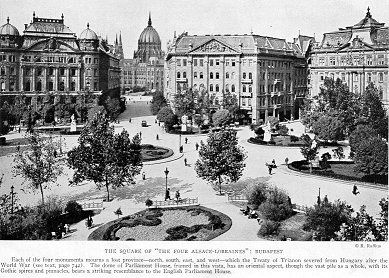 HUNGARY
has been without a king since the Habsburg family was dispossessed in 1918.
But the country that never cared for the Habsburgs has suddenly turned loyal,
more loyal indeed than Austria, which had her emperors to thank for her wealth
and luxury.* Hungary still calls herself a kingdom and has constitutionally
remained one.
HUNGARY
has been without a king since the Habsburg family was dispossessed in 1918.
But the country that never cared for the Habsburgs has suddenly turned loyal,
more loyal indeed than Austria, which had her emperors to thank for her wealth
and luxury.* Hungary still calls herself a kingdom and has constitutionally
remained one.
(*During 400 years the Habsburg emperors of Austria were kings of Hungary as
well. Hungarian taxpayers could spend as much as they liked, or did not like,
on making the Royal Palace sumptuous. But the Habsburg kings preferred to reside
at the grim Hofburg of Vienna, where they were emperors and at home. The Hungarian
nation always remained foreign to them, and Hungary suffered greatly in consequence.)
Admiral Horthy, who has been at the head of the Government for the past twelve
years, is styled Regent. He lives in the Royal Palace, but he has not discarded
the uniform of admiral of the Austro-Hungarian Navy, which has ceased to exist.
The Regent is acting temporarily in lieu of the king, though who that king may
be is yet to be seen.
THE NATION'S ULTIMATE RULER TO BI CHOSEN
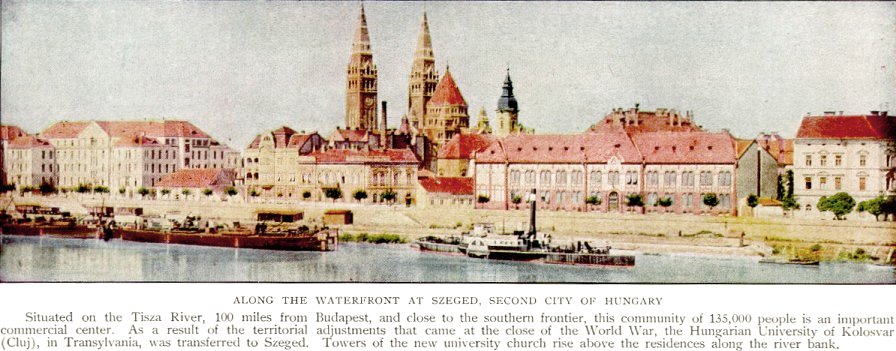
King Charles IV, last Habsburg to be crowned Emperor of Austria and King of
Hungary, died ten years ago. The eldest of his eight children, Otto, is being
educated abroad, an exile from the countries his forefathers ruled, and brought
up in a way that he may take his place one day as king of Hungary, a country
that has been reduced by the Treaty of Trianon to one-third of its former size.
By another international agreement the Habsburgs are excluded from succession
to the Hungarian throne except under conditions most unlikely to take place.
So the question is in abeyance, and no one knows how long it may remain so.
Thus has Hungary become that strange thing, unprecedented in history-a kingdom
without a king. Fortunately I forgot to think of all that whenever I looked
out of my window across the Danube. One can't keep up a climax of patriotic
depression for more than a decade and nothing would be further from the elasticity
of the Hungarian character than to do so. I gazed upon the four bridges that
span the Danube to unite old Buda and young Pest-as a matter of fact, there
are six of them, but the two others are rather too distant to be in the picture-arid
reflected upon the best place to go and have supper.
THE CAPITAL'S SUMMER APPEAL
St. Margaret Island, gay with cafés and hotels, the gray ruins of the abbey
and nunnery where Princess Margaret lived and died, slumbering beneath the oaks,
glittered a green gem in midstream, with little white steamers and swift rowboats
scurrying around it. From the rear windows I could look out upon the roofs of
Pest, sweltering in the heat. No daring skyline to Pest- houses seldom rise
above five or six floors-and most of the honors of silhouette go to Buda's battlements,
outlined against the setting sun.
Beyond Pest, however, where the horizon meets the outskirts of the city which
houses a million 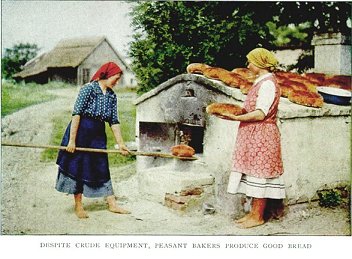 inhabitants,
beyond the long, straight line of Andrássy Street, lies green Town Park, waiting
for us with places of amusement, restaurants, and music. There are the pleasant
pavement cafés along the river, too, where one may eat ices and drink Tokay
wine and watch crowds sauntering past and lights glow, reflected in the slow-moving
river.
inhabitants,
beyond the long, straight line of Andrássy Street, lies green Town Park, waiting
for us with places of amusement, restaurants, and music. There are the pleasant
pavement cafés along the river, too, where one may eat ices and drink Tokay
wine and watch crowds sauntering past and lights glow, reflected in the slow-moving
river.
After passing in review all these summer joys of Budapest, we decided to stay
at home.
The children enjoyed it. They went marketing with cook, down below Francis
Joseph Bridge, to the Central Market Hall, where flat barges discard their loads
of fruit and vegetables at dawn, and mountains of melons and cabbages, of cucumbers,
and, above all, of paprika, Hungary's national spice, rise on the embankment.
They helped her carry home choice specimens of the screeching army of fattened
geese and juvenile chickens, to be bereft of their enormous livers or fried
in crisp bread crumbs and set afloat in paprika sauce, respectively, for the
benefit of the family.
The daily round of summer housekeeping in Hungary went on. Midday dinner remained
the feature of the day, a regular three-course meal, and preserves had to be
put up. Labor-saving in Hungary is as yet a dream. Of course, there are conserve
factories. The rich, mellow cherries, apricots, and peaches, with the glow that
the dry, warm climate and the volcanic soil lend to Hungarian fruit, stand in
canned rows on grocers' shelves here, as elsewhere, to be had for the asking;
but few really selfrespecting Hungarian housewives do ask for them.
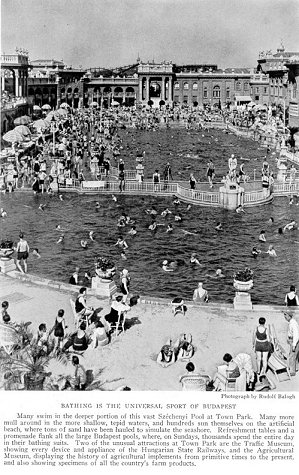 When
we had finished the apricot jam and the candied strawberries, there came a clay
when the cook, the housemaid, and I wallowed in tomato sauce. Then two bricklayers
sprawled upon the bathroom floor, since summer is the time for repairs,
When
we had finished the apricot jam and the candied strawberries, there came a clay
when the cook, the housemaid, and I wallowed in tomato sauce. Then two bricklayers
sprawled upon the bathroom floor, since summer is the time for repairs,
and a youth undertook to paint the bedroom ceiling, pacing the room, huge as
a primeval giant, using his ladders for stilts and whistling melancholy tunes
from morning till night. Thereupon I sat down and declared I was through.
"Very well," the head of the family acquiesced. "But you are
not to start over again, tiring yourself out with getting clothes and shutting
up the apartment and that sort of thing. We will spend a fortnight with the
Sághys at their Balaton estate; they have asked us ever so often. We don't need
clothes there. And as soon as they have a new batch of visitors coming in, we'll
just take tó our heels and roam about the country for a bit. The Carpathians
might be cooler, but `see Hungary first' is not a bad slogan."
THE FIRST BUDAPEST BRIDGE NEARLY A CENTURY OLD
The night before we started a lovely thunderstorm broke over Budapest. A fierce
deluge of almost tropical rain washed the trees, the hills, the houses, to a
gemlike morning brilliance.
The car that was to take us to our destination sped across Chain Bridge, the
first that had joined Buda to Pest a little less than a hundred years ago, taking
the place of the old boat bridge that used to be put up every summer. Count
Stephen Széchenyi was one of those great dreamers of Hungarian dreams whose
career ended in tragic defeat, but he had realized some of his great conceptions,
at least : the Chain Bridge, Danube regulation, and the Academy of Science,
in front of which stands his statue.
Our son István is young enough to shudder every time we pass below the St.
Gellért 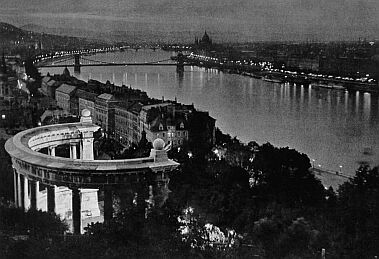 Memorial
upon the cliffs (see page 742), supposedly on the very spot from which the martyr
bishop, who first tried to convert stiff-necked pagan Magyars to Christendom,
was rolled down in a barrel into the angry river.
Memorial
upon the cliffs (see page 742), supposedly on the very spot from which the martyr
bishop, who first tried to convert stiff-necked pagan Magyars to Christendom,
was rolled down in a barrel into the angry river.
Soon the fates of bishops and martyrs were forgotten in the delights of "real
country." One can drive miles and miles
and miles in Hungary without seeing a trace of human habitations. Even in the
districts west of the Danube, which are by far the most densely inhabited, villages
and houses are few and far between. There is no waste land, however, in this
part of the country.
The storm of the previous night had done away with the white dust that is the
curse of the highways of Hungary, and the splendid Budapest-Balaton road stretched
out invitingly before us. We sped along the pleasant countryside, through the
occasional peaceful little one-horse towns and villages, consisting mostly of
a single wide main street, no more than a double row of low whitewashed cottages.
Two windows and a wide yard-gate face the street on each house and pillared
porches run along the whole length of the house on the yard side.
FOOTBALL AND HORSEBACK RIDING MOST
POPULAR SPORTS
At Székesfehérvár our older boy, János, tried to rattle off all that he had
learned about this ancient city, where kings of Hungary were crowned, down to
Ferdinand the First. Fortunately, however, we were passing the city playgrounds
and a football match that was in progress claimed the wayward attention of my
sons.
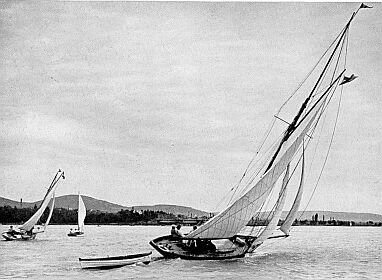 Football
has become almost a national game in Hungary. Baseball and basketball are unknown,
but Olympic and other international prizes speak for Hungarian prowess in football,
fencing, and swimming. Horseback riding is another national sport, tennis is
very popular, and athletics, which until recently had no part in any school
curriculum, now play a very large part indeed. A State college for physical
education has been established, and most boys under twenty - one are either
scouts or "leventes"- a term perhaps Nest translated by the words
"young knights."
Football
has become almost a national game in Hungary. Baseball and basketball are unknown,
but Olympic and other international prizes speak for Hungarian prowess in football,
fencing, and swimming. Horseback riding is another national sport, tennis is
very popular, and athletics, which until recently had no part in any school
curriculum, now play a very large part indeed. A State college for physical
education has been established, and most boys under twenty - one are either
scouts or "leventes"- a term perhaps Nest translated by the words
"young knights."
Practically every village boy is a "levente," but the term signifies
little save that the youths are drilled in their spare time in moral and physical
discipline.
LAKE BALATON IS HUNGARY'S OCEAN
The first glimpse of Lake Balaton, the "Hungarian Ocean," comes at
I,epsény, but nobody looks at it. The road here runs across an estate belonging
to the Nádasdy family, one of the most ancient and aristocratic of the country.
Countess Nádasdy had the idea of establishing a charming little roadhouse for
motorists at Lepsény, where excellent food and the choicest of Hungary's famous
wines are served by lackeys in knee-breeches. The Countess remains in the background,
but supervises her business, and no Budapest storekeeper running clown to Balaton
to spend a weekend with his family can resist the temptation of stopping here
to partake of a meal prepared by an aristocratic chef.
Soon Balaton spread before us, wide and calm. It is the largest lake in central
Europe and one of tile least known. It has the atmosphere and the moods of the
sea the loneliness, the colors, the whims, the untamed self-will of the ocean.
Storms come with terrific suddenness, and only old lakedwellers, boatmen, and
fishermen can read their signs (see, also, page 6c~4).
The stunner vacationists who flood the little lakeside places during July and
August often do not believe these old oracles of Balaton, who can discern, even
on a calm sunny day, the glassy green color of the water that forebodes evil.
Fatal disasters to canoes and yachts claim their victims every summer.
LIFE ON A HUNGARIAN ESTATIE IS FEUDAL
Balatondombori is a puszta of a thousand acres. Puszta is a term with a double
meaning. It signifies an estate or farm and at the same time it means the barren
plain, best translated with the Russian term of "steppe." There is
nothing barren about Dombori, however. Wheat, corn, rye, beets, flax, even lentils,
and other vegetables are grown on the puszta, and some of the finest cattle
in Europe graze in its meadows. The fields are bordered by apple, walnut, and
mulberry trees, and you eau never be sure when a little boy, his skirtlike linen
trousers stained with mulberry, his mouth likewise, will drop upon you from
a wayside tree, where he has been picking leaves for the silkworms, which the
peasants of this section tend in great numbers. Fences are practically unknown
in Hungary, except for lattices and plaited twigs around yards and gardens.
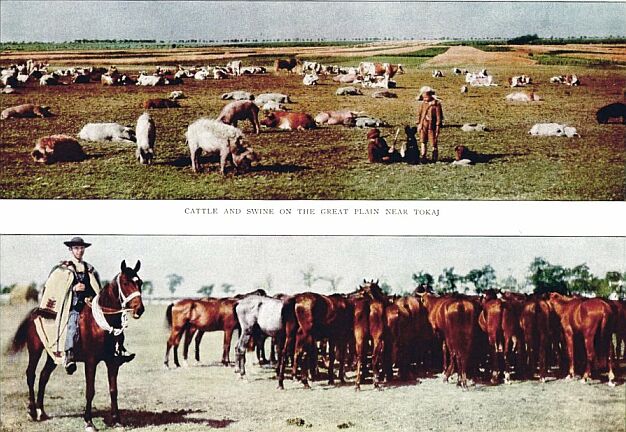
Life on a Hungarian estate is feudal and patriarchal at the same time. Our
destination, the pleasant country house at Dombori to which the peasants on
the farm and in the tiny adjoining village had given the grand name of "the
castle," was a groundfloor, whitewashed building of nine rooms, larger
but not much more imposing than the letter type of peasant cottages in the village.
It had all the difference of modern improvements, though, whereas the Hungarian
peasant aims at improvements only as far as his agricultural work goes.
Bathrooms are an unknown quantity in a peasant cottage, and the Nest room,
the "clean room," as it is called, is not lived in, bat kept merely
for show. A bed is piled as high as the ceiling with down-filled, elaborately
embroidered pillows and eiderdowns, but no one sleeps in it. The kitchen, the
porch, and perhaps another room suffice for the needs of the family.
THE IDEAL GUEST IS OBLIGATED TO GET FAT
In the peasant farmer's barn, however, you play find the most modern agricultural
machinery he can afford, and though Mr. Farmer has no knowledge of literature
or the fine arts, he is steeped in the sane philosophy of the man of the soil,
and has a profound interest in and mostly a very shrewd view of politics and
the wheat market. The Hungarian peasant talks little but he talks sense.
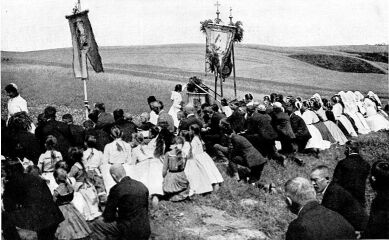
The "castle" at Dombori, however, is a home of culture and an ideal
place for being delightfully lazy. The only drawback to a Hungarian estate is
that you must get irrevocably fat. All the swimming in Balaton was of no avail
against the detrimental effects of the cuisine of the puszta. "Pörkölt"
chicken, turós csusza (dough boiled and garnished with cottage cheese, cream
and greaves), stuffed cabbage, and, above all, the royal dish of paprika fish
- richly seasoned stew that contains all the choice produce of the lake, which
prides itself on the variety of its finny tribes - cannot be withstood, especially
when you are a guest and don't have to look after the cooking.
Our hostess spent the hot mornings in the kitchen ordering about her scullions,
while we acquired appetites for dinner in the cool lake. I doubt, however, whether
we derived more enjoyment out of our kind of sport than she did out of hers.
She is a Hungarian housewife of the old school and is never happy unless she
has the house full of guests.
It is the head of the family who invites the guests, who is deeply hurt and
offended when they go away, who used to have carriage wheels removed just to
keep his guests there longer, in the good old clays when guests came in carriages,
and he blames his wife if visitors leave before they have gained at least five
pounds-a standard which must be kept up for the honor of the house and of which
a record is kept in the Dombori guest book!
THE "COW-UNCLE'S" FOLK TALES
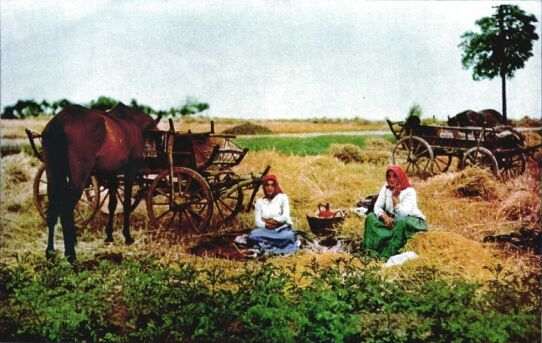 Pali
bácsi, the "cow-uncle" (small children always call older people "aunt"
and "uncle" in Hungary), was a great friend of my boys. Of the many
folk tales he related to them none were more popular than those legends relating
to the castle ruins that crown the volcanic basalt hills along the north shore
of the lake, and the tale about the peculiarly shaped pebbles - "goats'
nails" - that are found on Tihany Peninsula.
Pali
bácsi, the "cow-uncle" (small children always call older people "aunt"
and "uncle" in Hungary), was a great friend of my boys. Of the many
folk tales he related to them none were more popular than those legends relating
to the castle ruins that crown the volcanic basalt hills along the north shore
of the lake, and the tale about the peculiarly shaped pebbles - "goats'
nails" - that are found on Tihany Peninsula.
The story goes that in ancient times a beautiful golden-haired princess (Who
ever heard of a dark princess?) tended her golden-fleeced goats on Tihany Hill.
She had a lovely voice and was so proud of it that she guarded it jealously
from all people, thinking no one was good enough to hear it. The son of the
King of Balaton chanced to hear her one day and forthwith fell so deeply in
love with her voice that he sickened with longing to hear it again.
The princess tossed her head and refused to sing for him, although the youth
spent his days sitting on top of a wave just to catch a glimpse of her, and
ultimately died of longing. Thereupon irate King Balaton stirred up a storm
in which all the goldenfleeced goats were drowned. The lake still flings up
their nails on Tihany Beach when it is stormy.
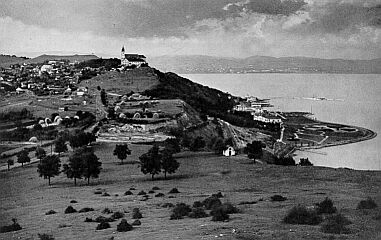
As for the princess, she was imprisoned in a cave on Tihany Hill, and the penalty
for her pride is that she must now answer anyone who cares to call to her. This
is the origin of the famous Tihany echo. When T was a child the Princess repeated
twelve or thirteen syllables, but so many villas have since been built on Tihany
that soon nothing will remain of the echo but the legend, and the Princess will
be well out of it.
As a worthy conclusion to our Balaton visit, we took the children on a motorboat
trip around the lake, visiting the twenty - odd small resorts and the few larger
places - Balatonföldvár, patronized by the wealthy; Siófok, summer paradise
of Budapest tradesmen's families ; Balatonfüred, health resort whose hot springs,
baths, and sanatorium are visited at all seasons of the year.
Balaton is a wonderful place in winter. The enormous frozen expanse, with its
famous sunsets, is incomparably beautiful, but the dwellers of the few lakeside
townships - Keszthely, Tapolcza - keep the pleasures of ice sailing, ice tobogganing,
and winter fishing through holes cut in the ice for themselves. Only Balatonfüred
has winter comforts for visitors.
THE LAST HABSBURG OCCUPIED A CELL IN TIHANY ABBEY
A kindly Benedictine monk showed us over Tihany Abbey, from the vault in which
lies interred King Andreas I of Hungary to the small bare cells where the last
king, Charles, and Zita, his wife, were interned in 1921.
Charles, landing in a plane that brought him from his exile in Switzerland,
had made one last attempt to regain his throne. He failed and was escorted by
water, across Balaton and along the Sió Canal, to the British cruiser Glowworm,
which took him down the Danube, by way of the Black Sea and the Dardanelles,
to Funchal, in the Madeira Islands, where he died a few months later.
Since we had contrived to gain twenty pounds among us in a fortnight, there
was no offense in saying farewell to our hosts, and the "castle" at
Dombori was ready to receive the next batch of visitors to be nourished.
BAKONY FOREST HARBORED ITS ROBIN HOODS
We motored through Balcony Forest, a region that still teems with legends about
19th - century highwaymen. "Poor fellows," the peasants called these
romantic figures, who were sons of local families, and the population, though
fearing them, had much sympathy with their exploits.
Our chauffeur, who had been evolved from a Balcony coachman, had learned the
ins and outs of a motor, but his heart was still attached to horses. His eyes
sparkled when he spoke of the horse-stealing feats of Sobri Jóska, the famous
Balcony highwayman.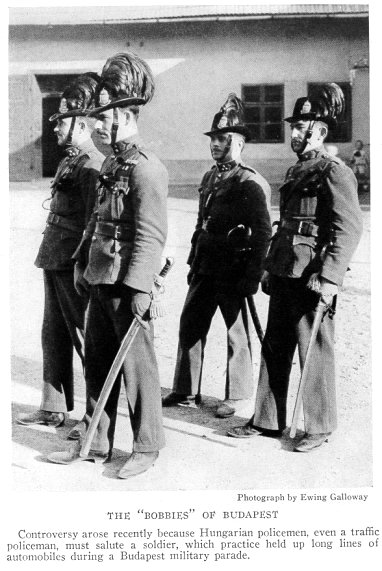
"This is just where Sobri Jóska shot down, single-handed, the four gendarmes
who had brought three of his men to the gallows, and he got away with all the
four horses, too," he added with enthusiasm.
Twilight was falling and I caught István glancing apprehensively round his
shoulder once or twice, although János jeered, "Silly ; that happened eighty
years ago !" But none of us minded getting out of the gloomy forest.
We spent the night at Veszprém, and in the morning at Körmend viewed a princely
mansion on one of the feudal domains of the wealthy old landed aristocracy of
Hungary.
We motored into Szombathely, a busy commercial center, and to the lovely old
Romanesque church at Ják. This is one of the few churches that were spared during
the Tatar invasion in the 13th century and by the Turks also. The Ják church
is beautifully restored and well worth seeing. But after Ják István rebelled.
He would have none of the fascinating Renaissance and baroque buildings in Sopron,
one of Hungary's most cultured provincial cities. He wanted his dinner and a
swim in Fertö Lake. But when he saw the reed-grown banks and the gray, dense,
shallow water of the lake that is now the boundary between Hungary and Austria,
he made a f ace.
"Balaton water is quite, quite different," he declared. "even
the Danube is more blue. Why, one can't swim in that-just wade." In rainless
summers it dries up entirely.
Austria, being better versed in salesmanship than Hungary, is nevertheless
making much of her side of Fertö. The reeds have been cleaned out, restaurants
and huts for week-end camping built on poles right into the lake, and trains
and motor buses convey
many visitors from Vienna. But my son was right. We got stuck as soon as we
started to swim, and even a sail in one of the shallow canoes failed to pacify
him. But my mother's heart saw advantages in a lake where drowning was out of
the question, although foundering seemed probable.
BACK IN BUDAPEST
In the afternoon we returned to Budapest by way of Gyor. Komárom, and Esztergom,
the seat of Hungary's highest church dignitary, the Arch Primate. The beautiful
cathedral on top of the hill overlooks the Danube, far into the country that
is now Czechoslovakia. An hour later we were back in our apartment.
The lights on the Danube, the radiance of reflectors shed on the Bastion and
the Citadel, looked as lovely as ever, but the apartment reeked of camphor,
naphthaline, paint, and plum jam. The flowers in the window-boxes looked parched,
and I realized I had missed my chance of winning a prize at the municipal competition
of "Flourishing Budapest" in the fall.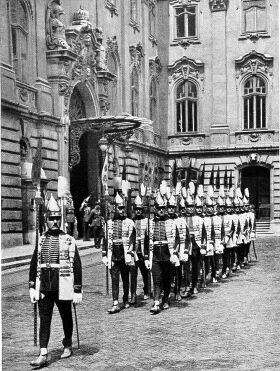
If you speak to a Hungarian he is sure to tell you during the first five minutes
of the conversation that there is no nation as unhappy as his own. A tragic
war, a disastrous peace, economic troubles, and unsolved political problems
might be expected to cast a shadow over this lighthearted city; but the casual
observer can not discover it. We have evidently grown used to troubles and carry
them well. Whenever you go to a restaurant or a play in the company of a Hungarian,
he will invariably wonder how all those people can afford to be there, and he
forgets that he is one of those who can't.
A DETOUR TO MEZOKÖVESD, FAMOUS FOR EMBROIDERIES
On the whole, I didn't mind leaving Budapest again on the following Sunday.
We had an excellent excuse for doing so. Our cook's sister was about to be married
and had invited me and the boys to the ceremony. Their home is in a slightly
out-of-the-way place-only two hours' walk from Eger, the nearest railway station.
Not a two hours' drive-the road isn't fit for that. A tiny village in the Mátra,
the highest range that is now left to Hungary.
That gave our trip somewhat the character of an excursion. The boys insisted
on taking a picnic lunch with us, although I told them, knowing what a wedding
feast means, that they would have all the trouble of carrying it home again
in their rucksacks. Incidentally, as it developed, there was no need to get
lunch or dinner for two days after. We were saturated.

I thought we might as well make a detour to Mezokövesd, the village of famous
costumes and embroideries, beloved by tourists. We started at an unearthly hour,
to be in time for early mass. I told the boys all about the gorgeous pageant
of beautifulpeasant costumes that they were going to see-the girls in white,
with intricately worked embroidery on countless petticoats, on finely bleated
blouse sleeves, on kerchiefs and shawls, with glittering, bespangled headdresses.
The women would wear shawls over their heads; they have no right to wear the
párta, or headdress, after they are married. "To tie up a girl's head"
is another way of saying "to marry her," and "a girl who has
kept on her párta" is a polite description of an old maid.
I told them the young matrons would be as gay as peacocks in their embroidered
aprons and skirts with bright ribbons, and the men would be resplendent in the
apparel that is characteristic of this part of the country-richly worked aprons
down to the ankles, full embroidered shirt sleeves,
gay cravats and streamers to their hats.
The embroidery techniques and patterns come down from mother to daughter and
belong exclusively to the various villages, like the patterns of Scotch tartans
belong to a clan.
Export trade discovered Mezokövesd embroidery some years ago. Since that discovery,
the patterns sometimes even come down from mother to son, for the lads are not
ashamed to ply the needle in winter, when there is no work in the fields.
We drove into Mezokövesd at a high pitch of excitement, only to find the market
place in front of the church deserted. A few old women in their peaked black
shawls were straggling about, a few children dressed like miniatures of their
elders, but no trace of the customary "church parade." Mass was over
; the ceremony evidently seemed to have been quickly disposed of.
István struck up a lightning friendship with a youngster who was munching mulberries
on top of a fence, and while we were yet helplessly wandering about in quest
of a bespangled párta or a few dozen swishing petticoats, he got information
and mulberries out of his new friend.
"It's market day in the next village, the big annual fair," he called
out. "That is where everybody has gone ; Feri here only stayed behind to
take care of his granny, who's sick !"
A PEASANT WEDDING
But the wedding was a distinct success. I have wandered about a good deal in
my country, but I had never seen this type of festivity before. Juliska, our
cook's sister and our housemaid of the previous year, was not as beautifully
attired as the Mezokövesd girls are wont to be, but she wore a dozen petticoats
under her skirt, all the same, just to show that she was anything but penniless
; also, to prove this fact, there was her bedding. It was piled on a cart and
taken to the new home, where her fiancé's female relations had the duty-or the
privilege?-of unpacking it.
Criticism would have been far from tolerant, had there been any occasion for
it, but Juliska's trousseau was impeccable. Accordingly, her mother-in-law gave
her the grandest wedding cake that I have ever seen-a splendid affair, hung
all over with ginger-bread hearts, and swords, and hussars, and babies-especially
babies. Two girls carried it up to the bride's house on a stretcher.
The guests arrived with gifts of wedding cakes of their own. These had the
shape of churches, stags, and hens outlined in candy; but the reason why these
shapes were traditionally repeated remained a mystery. They had always been
so. finally, one little girl presented Juliska's parents with a big rag doll,
whether as a substitute for the daughter they were about to give up or in anticipation
of a grandchild seemed doubtful.
The church ceremony was quite simple and soon over. Not so the dinner. When
we left, the first few courses had barely disappeared ; there had only been
hen soup, stuffed cabbage with homemade sausages, paprika chicken, roast duck
and geese, curd cakes, and pastry, so far. It was about to begin all over again
and finish up with fánk, a kind of glorified griddle cake, and sweet pastries,
the whole generously washed down with the slightly sour, light wine of the countryside.
We spent the night at Eger in an excellent hotel. The city has a Turkish minaret
and on a green hilltop the ruins of the castle which a Hungarian amazon, Katica
Dobó, with a little army of women, helped their weary and war-worn menfolk defend
against the Turk.
While Eger has a number of beautiful baroque houses, courtyards, and gates
dat
ing from the days of Maria Theresa, the city's finest building is the Catholic
seminary and library.
THE HORTOBÁGY PLAIN EXPLAINS DEBRECZEN'S PROSPERITY
János and István were looking forward to finding historical relics in Debreczen,
but they were disappointed. The War of Liberty in 1848-49 is the period that
fires the romantic imagination of every Hungarian boy. To Debreczen, the big
city in the heart of the great plain, fled the first independent Hungarian cabinet
when the Austrian army was bearing down upon Pest, bombarding the town from
the Buda Hills. In Debreczen's Big Church the dethronement of the Habsburgs
was declared 83 years ago, and here Kossuth was established Governor of Hungary.
János went to sleep that night over a volume of Petofi's revolutionary poems.
but when we climbed out of the eiderdown beds of the Golden Bu11 next morning
we found little to gratify our curiosity.
There is the Big Church, to be sure, the old college, the little old houses
in the market place, but when all is said and done Debreczen is just a vast
Hungarian village, a multiplication of endless village main streets, until you
come to the handsome new university buildings in the Nagyerdo, the city's forest
park.
With the memories of the wedding feast still vividly present, we spent little
time over lunch and made an early start for Hortobágy in a hired carriage and
pair.
Hortobágy is really what Debreczen stands for and lives on-a vast puszta that
belongs to the city, an unbroken area of pasture land, where the city's famous
cattle and horses are bred. It was what tempted the nomadic Asian race of Magyars
to stay in the fertile valleys of the Duna (Danube) and Tisza rivers when they
came across the Carpathians in search of fresh pastures a thousand years ago.
HERDMEN OF HUNGARY LIVE IN HUTS OF CLAY AND REED
We spent the night at an old inn, the only stone building far and wide, on
Hortobágy. Cattle ranchers and horseherds live in reed and clay huts, alone
with the sun, the stars, with infinity and their animals. (See "Hungary,
a band of Shepherd Kings," by C. Townley-Pullam, in the NATIONAL GEOGRAPHIC
MAGAZINE for October, 1914.)
When I came out in the morning, István was trying to make friends with an old
cowherd who was having a little morning drink by himself in front of the inn.
"Aren't you warm in that sheepskin cloak, uncle ?"
The Hortobágy herdsman is very taciturn by nature, but then István is irresistible.
"It keeps me cool, son ; keeps the sun off."
"Then what do you wear in winter ?" "This same cloak. Keeps
the cold off." "Have you ever been to Budapest, uncle ?"
"I have, in 1896, when they had that exhibition on."
"Not since ? I wasn't born then. But of course you go into Debreczen often
?"
"What should I go into Debreczen for, son ?"
"Oh, just to see the town and the people and buy things in the shops-go
to the movies..."
All the contempt of the puszta dweller for the scurrying busybodies in the
city lurked in the old man's smile as he sat there, unchanging, unmoved as Hortobágy
itself.
"I haven't been in Debreczen these ten years ; the women go in and get
what we need."
What he needs is bacon, paprika, and tobacco-and a pair of boots every ten
years or so. The sheepskin cloak lasts a lifetime.
HORTOBÁGY CATTLE ARE BRED IN THE OPEN
It took some time, but István got him round his little finger at last. He did
it by singing the praises of the cows in Dombori. Our Hortobágy cowherd wouldn't
stand for that. He has a pride of his own. He wanted to show us that 'I'ransdanubian
cattle were just miserable cats as compared to those on Hortobágy. And he began
to show off. He just stood by and watched us-a man who is sure of himself. The
cattle didn't belong to him, but he belonged to them-more than to the world
of human beings in the city.
Some of the best cattle in Europe graze on the Hortobágy plain, hardy from
being bred in the open air summer and winter, and some of the finest horses
in the world can he found in the city of Debreczen's famous stud.
Of course János wanted to ride bareback. In consequence I hurried over the
preparations for departure.
"But we have really seen nothing of Hungary," my sons complained.
"The cities-Pécs, Kecskemét, Szeged-the Tisza River, grape-picking at Tokaj-there's
so much more to be seen."
I mentioned school, about to begin. János retorted with something about the
advantages of learning history and geography in the practical way.
Finally a telegram from home set an end to the discussion. It ran
"Carpenters departed ; fall cleaning completed; cook returned; paprika
preserves in full swing. Longing for my family."
There was no resisting such a summons. The next day saw us on our way home,
to tell about our experiences and to discuss what would be the best thing to
do next summer.
 HUNGARY
has been without a king since the Habsburg family was dispossessed in 1918.
But the country that never cared for the Habsburgs has suddenly turned loyal,
more loyal indeed than Austria, which had her emperors to thank for her wealth
and luxury.* Hungary still calls herself a kingdom and has constitutionally
remained one.
HUNGARY
has been without a king since the Habsburg family was dispossessed in 1918.
But the country that never cared for the Habsburgs has suddenly turned loyal,
more loyal indeed than Austria, which had her emperors to thank for her wealth
and luxury.* Hungary still calls herself a kingdom and has constitutionally
remained one.










